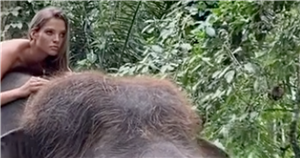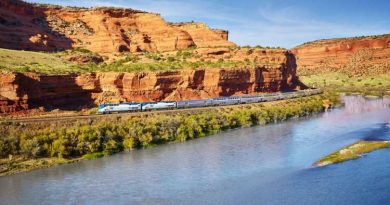A Step-By-Step Guide to Planning a Memorable Ancestry Trip
All products featured on Condé Nast Traveler are independently selected by our editors. If you buy something through our retail links, we may earn an affiliate commission.
More than 30 million people have taken DNA tests. When that data comes back, many people feel inspired to dig deeper into who they are and where they come from, sometimes deciding to plan a trip to a newly discovered homeland. While some choose to tackle the research on their own, ancestral travel is an area where hiring a specialist can make a big difference—unlocking experiences and facilitating connections that would be difficult to do alone. Here’s what to consider as you get started.
Establish your goals
Heritage and genealogy are sometimes used interchangeably, but they mean different things to the specialist planning your trip. The former is about connecting to the broader history and culture of your ancestral country; the latter focuses on family connections. If you want to learn about history and art in Ghana, a heritage trip may suffice. But if you want to find the barn where your Portuguese great-grandmother was born, or locate a birth parent in India, that’s a genealogical project which requires archival research and deep contacts within a region. A trip can be both, but you must articulate your wishes early on.
Find the right specialist
Some operators have genealogists on staff or in their network. Others, like Jan Sortland, a Condé Nast Traveler Top Travel Specialist for Norway, are genealogists themselves. There are also companies that focus on genealogy travel. Many, like My China Roots and Ancestral Attic Poland, cater to specific communities, while a few, like Ancestral Footsteps, founded by Sue Hills, a producer of the BBC’s Who Do You Think You Are? television series, have a broader scope. Even DNA testing companies have gotten into the game. Ancestry has a research arm called AncestryProGenealogists, which, in conjunction with Kensington Tours, offers private trips with experts and local guides. It also runs genealogy-themed cruises with other partners, including AMA Waterways, Cunard, and Regent Seven Seas.
You can also tap the groups or forums on your DNA testing company’s site for recommendations and reviews, or hire a genealogist from the searchable roster of the Association of Professional Genealogists and the International Commission for the Accreditation of Professional Genealogists and ask whether they’ve partnered with a travel specialist before. Fellow heritage hunters are another good resource. Terry Koch-Bostic, chair of the Education Committee for the National Genealogical Society, recommends reaching out to an organization that specializes in your background and asking for references.
Review past itineraries
To decide if a specialist has the chops to transform DNA data into meaningful travel, ask about heritage trips they’ve created for past clients. Rami Girgis, a Condé Nast Traveler Top Travel Specialist for Egypt, has obtained permits to visit historic Jewish temples normally closed to the public and once arranged a meeting with Magda Haroun, a leader of the small Jewish community in Cairo.
Check for language and history skills
Language can be a big roadblock to genealogical research—especially if a tongue has evolved or died out over time. While these changes can make some documents impenetrable for non-natives, astute specialists will have experience untangling them. It’s not only words that disappear, either—countries and borders do too, so the person you’re working with should have extensive knowledge of the place’s history. Gwen Kozlowski, a Condé Nast Traveler Top Travel Specialist for Eastern Europe, explains, “In Poland, a lot of towns have the same name because they were partitioned and borders shifted often. So I might know that your ‘Watertown’ is not the one by Warsaw, and that it’s the village, not the town.”
Make a research plan
Will your specialist do the family-history digging for you, or do they expect you to do the legwork? The answer is typically some combination of the two, so it’s important to sort that up front because it affects time and cost. If you’re doing the work yourself, Koch-Bostic suggests tackling family history one question at a time, lest you’ll quickly be overwhelmed and frustrated. The National Genealogical Society website offers free tutorials and other resources. Just keep in mind that overseas, on-the-ground research can be challenging to do by yourself: Archives may be in a foreign language, or closed to the public, or require advance reservations to access. Koch-Bostic recommends doing as much research as you can at home and online.
If your specialist (or one of their partners) will be doing the research for you, gauge their abilities by testing them. Norway expert Sortland says, “I would normally do something small for free as a taster to show what I can do for them.” A reasonable request, he explains, might be to look for your Scandinavian forefathers in a census; determining whether your great-great-grandfather’s farmhouse is still standing, however, is too much of an ask.
Next, find out what documentation is needed. “I ask clients to send me everything they have,” says Kozlowski. “Dates of birth, dates of death, dates of marriage: Those bits of data help us locate the family.”
Condé Nast Traveler Top Travel Specialist Mei Zhang concurs. She has worked with adoptees to find their Chinese birthplaces, noting that even seemingly unimportant items can hold valuable clues. “Any piece of paper that has writing on it makes things much, much easier for us,” she explains. “Let’s say there was a photo with a background at the airport or characters of a hospital name. With that information, we search for the location in the Chinese name. Then we figure out if it’s from an orphanage, the original Chinese name of the child, the name of the orphanage, and any person they dealt with. Then a series of phone calls would follow. My team would call the local orphanage to identify someone and take it from there.”
Start packing
Katherine Borges, director of the International Society of Genetic Genealogy, never travels without DNA tests in her bag. While it may be unreasonable for others to do the same, you should pack copies of photos and documents for any family you might encounter; a camera or recorder app to capture their stories and voices; and family charts and trees for keeping your discoveries organized.
Finally, think about what you’d want to say to a new family member. “Be courteous,” says Koch-Bostic. “They don’t have to tell you anything; you have to make them want to share things. So you might say, ‘I would love to know more about my mother’s family, and you’re one of the few people who can tell me that.’” Most important, she says, is recognizing that these meetings are special and using the time wisely. “Ask about things no record can tell you. Ask them about their lives.”
Your DNA test result might even inspire you to uproot your life
A recent ancestry test inspired Chavonna Frazier to visit Sierra Leone. She was so moved by her experience she is uprooting her life in California to start a new one abroad.
My ancestors were victims of the transatlantic slave trade; many of their descendants died not knowing where they came from. I took a DNA test from African Ancestry, which specifically serves people of African descent, and matched with the Mende people of Sierra Leone. I wanted to pay respects to my ancestors, so I organized a 2019 trip for eight people—all Mende—whom I met through African Ancestry’s online forums.
Planning a trip like this on your own is hard. I knew what I wanted to see, but I didn’t know how to go about it. Eugenia Chinsman of Manstravel specializes in African travel and is from Sierra Leone. She went above and beyond, and her tour operator on the ground—Alieya Kargbo, the founder and director of Tourism Is Life, in Freetown—had great connections. He mentioned us to the minister of tourism, and it eventually got up to the president that we were coming. He and the country opened their arms to us. They said, “We are so happy to see you. Why haven’t you come sooner?” They even offered us citizenship as a way to move beyond past tragedies.
When we met the Mende paramount chief, Prince Lappia Boima, of the Kakua chiefdom in the Bo district, there was a huge celebration, with dancers, traditional libations, and a Mende naming ceremony. It was very emotional, like closure.
After visiting again, I’ve decided to move to Sierra Leone this May. I’m starting my own travel company, Roots N Salone Tours, and partnering with Alieya on DNA trips. I know the trauma that a lot of people in the African community carry about being displaced, but we are blessed to live in an age with technology that tells us not just where we come from, but also our tribe or ethnic group. If you find that out, then you find out who you really are: your culture, your religion, your heritage. As told to B.C.
This article appeared in the April 2021 issue of Condé Nast Traveler. Subscribe to the magazine here.
Source: Read Full Article



